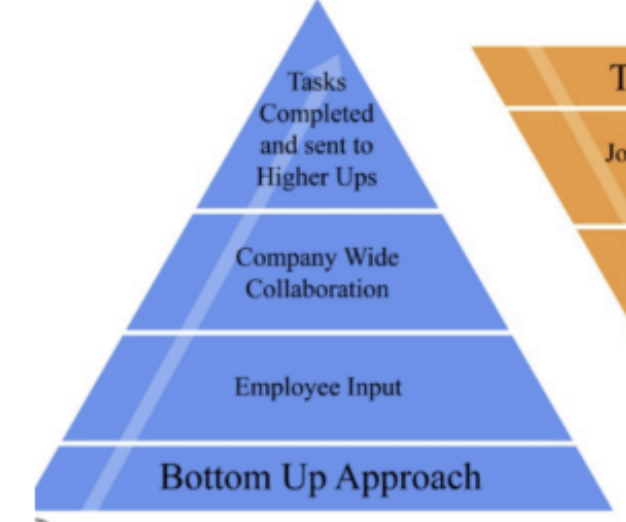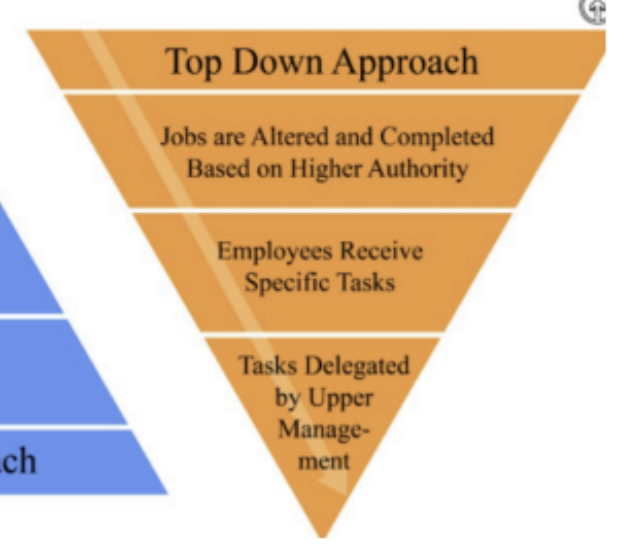Organizational Structure
1/29
There's no tags or description
Looks like no tags are added yet.
Name | Mastery | Learn | Test | Matching | Spaced |
|---|
No study sessions yet.
30 Terms
What is Horizontal Hierarchy (bottom-up)?
Flat/bottom-up organizations attempt to engage ALL employees

What are benefits with horizontal hierarchy?
Encourage intrapreneurship in an org
promote/recognize innovation at all employee levels
Create better engagement/satisfaction among employees
allows employees to:
Be creative, feel comfortable asking questions about tasks, promote efficiencies they develop, can lead to inconsistencies between sites
What is the Vertical Hierarchy/top-down?
systemize employee activity more substantially

What are the goals in Vertical Hierarchy?
Focus on consistency of completing tasks
Training employees on what is expected
May not always provide needed background to understand why
What are the benefits with Vertical Hierarchy?
Understand expectations, limits the questioning of “why” things are done a certain way, eliminates the likelihood of inconsistencies between sites
What is Organizational Culture?
Shared beliefs shared held by members of the organization that guide interpretation and action by defining appropriate behavior for various situations
influenced by reason for existence, organizational ethics
What are the 3 types of organizational culture?
Constructive culture
Passive-defensive culture
Aggressive-defensive culture
What is constructive culture?
members are encouraged to interact with people and approach tasks in ways that help them meet their higher-order satisfaction needs
What is Passive-defensive culture?
members believe they must interact with people in ways that will not threaten their own security
What is Aggressive-defensive culture?
members are expected to approach tasks in forceful ways to protect their status and security
What can a positive culture help develop?
retain quality employees, attract quality new talent, enhance efficiency, encourage teamwork and open communication
What can a negative culture lead to?
toxic environment with employee turnover, discourages employees from exploring innovation, discourages teamwork and leads to focus on independent work, employees become defensive and try to avoid blame
In the Inpatient health-system pharmacy, the general inpatient pharmacy org structure has typically been developed at….
individual sites (hospitals)
What does the Inpatient health-system pharmacy typically involve?
director of pharmacy (overall pharmacy management position)
Director of clinical pharmacy (manages clinical pharmacists/programs)
Manager of inpatient pharmacy (manages central pharmacy activities)
What is the fundamental function of a hospital pharmacy?
Procurement, distribution and control of all pharmaceuticals used within the facility
What is the workflow related to the distribution process in a hospital pharmacy?
Multiple individuals, dispersed throughout the facility, impacts most
aspects of inpatient care
Management of inpatient pharmacy services has significant impact on
the overall facility
What is the organization culture at large chain community pharmacies?
Focus is on implementing systematic approaches to operating pharmacies
What do large chains mainly have in their organizational culture?
Corporate headquarters who oversee: regional directors/managers; local managers who oversee staff, techs, local pharmacy services and workflow
What is the organization culture at small chain/independent community pharmacies?
Focus is on local store/pharmacy operations
Typically offers much more flexibility
Requires more engagement by PIC in overall mngmt (sets local culture, less corporate support)
What is the organization culture at outpatient health-system pharmacies?
operate similar to traditional community pharmacies
focused on outpatient dispensing
management strategies target safe, effective, accurate rx dispensing
What do most outpatient health-system management structure involve?
local pharmacist manager, organizational pharmacy director, all fit under the umbrella of overall health-system administration
What is the impact of corporation size on organizational management that is larger?
the larger the corporation → the larger the number of decision makers →
greater impact of each organizational decision, increased difficulty to ensure consistency between sites, increase oversight from corporate decision makers
What is the impact of corporation size on organizational management that is a single store/small corporation?
increased freedom to employees, often embrace employee driven innovation
In the pharmacy work environment, what can impact the day to day operations?
what the pharmacy’s organizational structure and practice setting
How can an optimal pharmacy design and layout options can be developed?
perform a workflow analysis
What is workflow analysis?
Defined as a systematic process by which tasks being performed in a particular work environment are broken down into individual steps and evaluate for variables such as accuracy, safety, efficiency, customer/patient satisfaction
How are tasks treated in a workflow analysis?
all essential tasks are identified
order in how the tasks/steps of process will be performed, along w/ environment in which steps will be conducted, are described and designed
What is a psychosocial environemnt?
relationships, employee attitudes, individual autonomy, organizational culture
What is a physical environment?
workspace, temp, airflow, safety, security
What is an important trait of the environment that should be considered in workflow design?
adaptability of environment
organic workflows allow for modification based on needs
mechanistic workflows are more rigid